A reminder of conditions brought on by trying to protect ourselves, such as wearing a mask, or using other PPE. They are now less common, although remain an issue for medical staff and some members of society.
Including a range of skin conditions in Covid-19 symptoms became more common as the pandemic progressed. Less prevalent than other issues, such as a cough, or high temperature but still needing to be given careful thought:
- Developing conditions which look like chilblains, on your toes, or fingers, or a rash on your skin can be symptomatic of Covid-19.
- Similar conditions are however common in normal times, discerning one cause from another is difficult without professional diagnosis.
- You should seek an opinion from a consultant dermatologist, by video link if you still wish to avoid contact, although a safe visit for any tests required can be arranged.
Whilst the pandemic is in a governmental sense over and we are now “living with Covid”, symptoms do still occur and we continue to learn, through ongoing research. Skin symptoms can occur at a later stage of infection, or be the only initial sign of infection.
We are grateful to Dermnet for collecting images of Covid related symptoms from a number of dermatologists, a selection are shown below. We should all still bear in mind that each person’s symptoms can be unique.
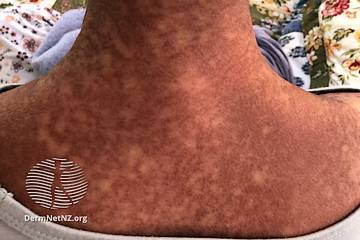
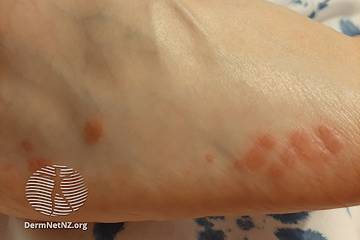
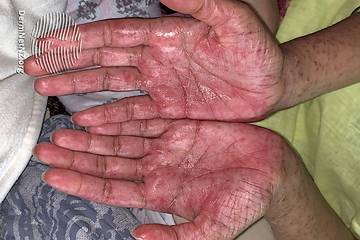
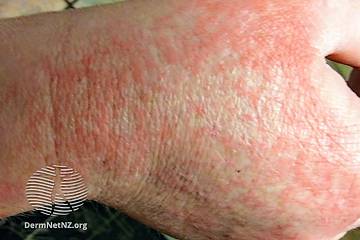
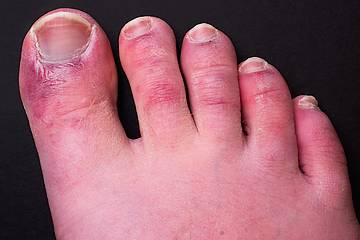
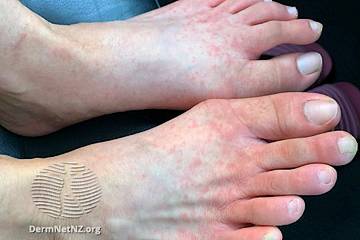
Linked Conditions
What is being called “Covid toe” is a condition similar to chilblains, which brings a red, or purple, swollen look and can be painful. Research to date has confirmed Covid-19 viral particles within the toe in some cases.
The cause is likely to be your body mounting an immune response to the virus, so can in a way be a positive but there are a small number of cases where this is part of serious infection, specialist diagnosis is important.
Rashes of various forms have been linked to coronavirus. They have been described as similar to urticaria, chickenpox, nettle rash, or other conditions, as they do not in themselves have a name.
They could consist of pink, white, or red flat, or raised areas on your skin, or a blotchy appearance, with a net like pattern. They are more common in serious cases, where covid-19 is already known but can appear as sole symptoms.
A research program by King’s College London found that 9% of people who tested positive for the virus, suffered a skin rash. This compared with 5% of patients who had tested negative for coronavirus.
There is little doubt that the points above can be symptomatic of Covid-19, yet are common medical conditions. We still suggest everyone takes notice if they do develop these symptoms, with some groups needing closer care.
Enhanced Risk
Thankfully, children are much less likely to suffer from illness due to coronavirus, although a very small percentage can develop a significant, multi system inflammatory response, which puts them at risk.
Whilst this is rare, their blood vessels, organs and ultimately their life could be impaired without treatment. Developing rash type symptoms is often associated with this issue, typically a red, itchy rash on the body, perhaps skin peeling.
There have been reports of rashes being less common on people with darker skin. Recent research does not support this and the problem may be that discerning redness in darker skin is more challenging, especially in a busy, general setting.
Bearing in mind there is still a view that certain ethnic groups are more liable to a serious outcome from coronavirus, consulting a unit with knowledge of dermatology for darker skin makes sense.
Growing Knowledge
A degree of uncertainty is inevitable in our understanding of a new disease, not least when skin conditions are a common part of life. We do not want people to assume a Covid-19 infection, even with a positive test.
The skin condition may in any event require treatment and our understanding of coronavirus related symptoms has grown. Not least for individual patients, when their personal symptoms and medical history are assessed.
If you have concerns about a new skin issue, our staff will be happy to advise. Whatever the cause, taking a safe approach is important in current times.
You may find the options below useful:
- Alphabetic Dermatology Menu: Conditions & Treatments.
- Up to date news and insight in: Our Dermatology Blog.
For any advice, or to arrange a dermatology appointment, call 020 8441 1043, or send us an email via the Make An Appointment button below.
